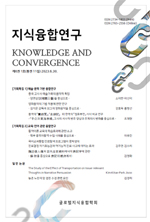국어교과통합 진로탐색 프로그램이 중학생의 진로결정 자기효능감과 역기능적 진로 사고에 미치는 효과
The Effects of Korean Subjects Integrated Career Education Program on Career Decision Making Self-efficacy and Dysfunctional Career Thinking of Middle School Students
- 389

본 연구는 국어교과통합 진로교육 프로그램을 구안하여 학생들이 국어수업 내용과 자신의 꿈을 키워나갈 수 있는 진로 교육을 융합함으로써 학생들의 진로결정 자기효능감과 진로 사고에 어떤 영향을 미치는지 알아보는 데 목적이 있다. 연구 방법은 다음과 같다. 첫째, 중학교 3학년을 대상으로 국어교과통합 진로교육의 필요성을 고찰하였다. 둘째, 국어교과 성취기준과 진로연계 학습 요소를 융합하여 국어교과통합 진로교육 프로그램을 구안하였다. 셋째, 서울 소재 중학교 3학년 학생 127명 중 63명의 실험집단을 대상으로 국어교과통합 진로교육 프로그램을 8차시 적용하였다. 진로결정 자기효능감 검사 도구는 Taylor와 Betz(1983)가 개발한 진로결정 자기효능감 척도(Career Decision-Making Self-Efficacy Scale-SF)를 이은경(2001)이 중·고등학생들을 대상으로 타당화 작업한 것을 사용하였다. 진로결정 자기 효능감 척도는 목표선택, 직업정보, 문제해결, 미래계획 등 4개 하위요인의 총 25문항으로 구성되어 있다(이은경, 2001). 진로사고 검사(Career Thought Inventory: CTI) 도구는 Sampson 등(1996)이 개발하고 장선철(2003)이 요인분석하여 타당화한 검사 도구를 사용하였다. 이 검사지는 진로와 관련된 역기능적 진로 사고를 측정하는 것으로 진로 결정 과정에 관한 일반화된 의사결정 혼란, 수행불안, 왜곡된 정체감 등 3개 하위요인의 총 26문항으로 구성되어 있다. 수집된 자료는 SPSS 25.0을 사용하여 독립표본 t-test를 통해 두 집단 간 동질성 검증을 하였고, 이후 대응표본 t-test(Paired samples t-test)를 실시하였다. 그 결과 실험집단의 진로결정 자기효능감 전체 사전 평균점수는 84.35점, 사후 평균점수는 98.90점으로 국어교과통합 진로교육 프로그램을 실시하기 전보다 실시한 후 진로결정 자기효능감이 높아졌으며, 통계적으로 유의미한 차이를 보였다(t=-7.644, p<.001). 또한 실험집단의 진로사고검사의 전체 사전 평균점수는 54.21점, 사후 평균점수는 46.84점으로 국어교과통합 진로교육 프로그램을 실시하기 전보다 실시한 후 역기능적 진로 사고의 수준이 낮아졌으며, 통계적으로 유의미한 차이를 보였다(t=3.430, p<.01). 이와 같이 실험집단에서 국어교과통합 진로교육 프로그램을 실시하기 전보다 실시한 후에 진로결정 자기효능감 전체가 향상되고, 역기능적 진로 사고가 감소한 것으로 확인하였다. 본 연구는 다음과 같은 의의를 지닌다. 첫째 국어교과통합 진로교육 프로그램을 통해 학생의 진로결정 자기효능감을 향상시켰다. 둘째, 학생들이 진로탐색을 하는 데 있어 방해요소가 되는 역기능적 진로 사고를 감소시켰다.
The purpose of this study is to find out how it affects students’ career decision-making self-efficacy and career thinking by devising a career education program that integrates Korean language subjects and integrating the contents of Korean language classes with career education that enables students to develop their dreams. there is. The research method is as follows. First, the need for career education integrated with Korean subjects was examined for the third year of middle school. Second, a career education program integrated with Korean language subjects was conceived by converging Korean language subject achievement standards and career-related learning elements. Third, the Korean language integrated career education program was applied to the 8th class for an experimental group of 63 out of 127 third-year middle school students in Seoul. As a career decision self-efficacy test tool, the Career Decision-Making Self-Efficacy Scale-SF developed by Taylor and Betz (1983) was validated by Lee Eunkyung(2001) for middle and high school students. used The self-efficacy scale for career decision-making consists of a total of 25 questions of 4 sub-factors: goal selection, job information, problem solving, and future planning (Lee Eunkyung 2001:49). The Career Thought Inventory (CTI) tool developed by Sampson et al. (1996) and validated by factor analysis by Jang Seon-Cheol(2003) was used. This questionnaire measures career-related dysfunctional career thinking and consists of a total of 26 questions in three sub-factors: generalized decision-making confusion, performance anxiety, and distorted identity regarding the career decision-making process. The collected data was verified for homogeneity between the two groups through an independent sample t-test using SPSS 25.0, followed by a paired samples t-test. As a result, the experimental group's total pre-average score for career decision self-efficacy was 84.35 points, and the post-average average score was 98.90 points. (t=-7.644, p<.001). In addition, the overall mean score of the career thinking test in the experimental group was 54.21 points, and the mean post-test score was 46.84 points. (t=3.430, p<.01). As such, it was confirmed that the overall self-efficacy in career decision-making improved and dysfunctional career thinking decreased after the implementation of the integrated Korean language career education program in the experimental group compared to before the implementation. This study has the following significance. First, the career decision-making self-efficacy of students was improved through the career education program integrated with Korean subjects. Second, it reduced the dysfunctional career thinking that interferes with students’ career exploration.
1. 서론
2. 이론적 배경
3. 연구 방법
4. 연구 결과
5. 결론 및 제언
(0)
(0)